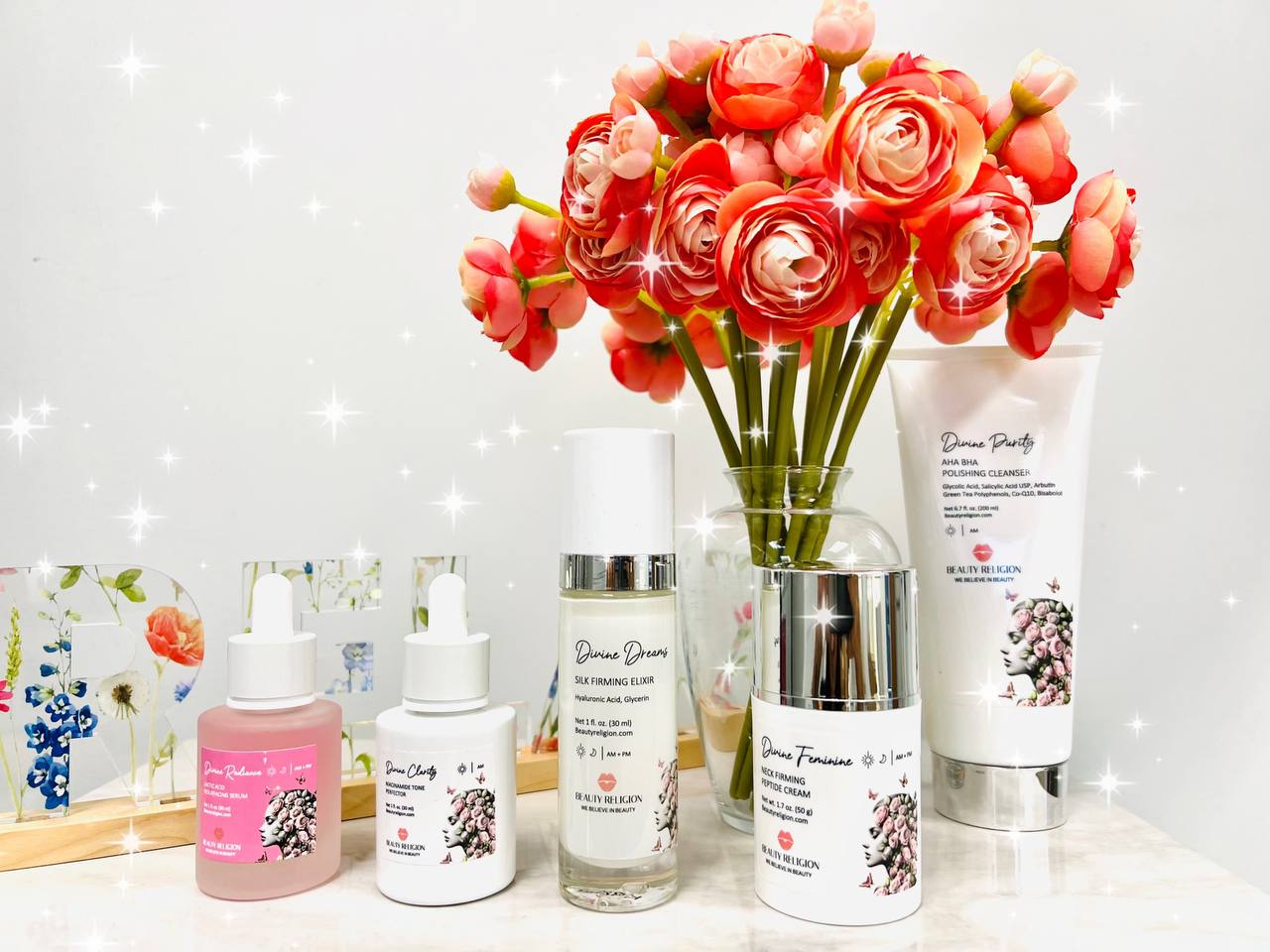The Power of Self-Care for Your Skin

How Prioritizing Skincare Transforms Your Complexion
Your skin is your body’s largest organ, and it deserves attention, love, and proper care to stay healthy, radiant, and youthful. Skin self-care isn’t just about applying fancy creams and serums—it's about developing a routine that nurtures, nourishes, and protects your skin from environmental stressors, aging, and damage.
In this blog, we’ll explore the power of self-care when it comes to skincare, and how making skin health a priority can transform your complexion from dull to glowing, and from stressed to balanced.
Skincare Is Self-Care: Why It Matters
The Science: Our skin is constantly exposed to external factors such as pollution, UV rays, and harsh weather, which can take a toll on its health. Skincare is more than just a beauty ritual—it’s a health practice. Proper skincare can help prevent premature aging, reduce inflammation, and improve your skin's ability to repair itself. When you care for your skin, you’re investing in its long-term health and resilience.
What You Can Do:
Develop a consistent skincare routine that includes cleansing, moisturizing, and protection (SPF).
Use products suited to your skin type and concerns, whether it’s dryness, acne, or aging.
Make skincare a ritual that feels nurturing—taking time for self-care can be deeply calming and restorative.
Cleansing: The First Step in Skin Self-Care
The Science: Clean skin is the foundation of any skincare regimen. Cleansing helps remove dirt, oil, makeup, and environmental pollutants that can clog pores and cause breakouts or dullness. When you cleanse properly, you allow the rest of your skincare products to work more effectively, as they can penetrate the skin without obstacles.
What You Can Do:
Choose a gentle cleanser that suits your skin type—whether it’s gel-based for oily skin or cream-based for dry skin.
Cleanse twice a day (morning and night) to remove impurities and refresh the skin.
Don’t skip this step, even on days when you're not wearing makeup—your skin needs to breathe and repair itself overnight.
Moisturizing: Hydration for a Glowing Complexion
The Science: Hydrated skin is happy skin. Moisturizing helps lock in water and create a protective barrier to prevent moisture loss. As we age, our skin naturally loses moisture and its ability to retain it, leading to dryness, fine lines, and a lack of elasticity. Moisturizing regularly helps keep your skin plump, youthful, and radiant.
What You Can Do:
Use a moisturizer suited to your skin’s needs, whether it’s a lightweight gel for oily skin or a rich cream for dry skin.
Consider products that contain humectants like hyaluronic acid, which draw water into the skin and keep it hydrated.
Don’t forget to apply moisturizer to your neck and décolletage—these areas are often neglected but show signs of aging just as much as the face.
SPF: Protecting Your Skin from the Sun
The Science: Ultraviolet (UV) radiation is one of the leading causes of premature skin aging, as well as skin cancer. Even if you’re not outside all day, daily UV exposure (especially from the sun’s rays streaming through windows) can damage your skin. Wearing sunscreen daily is the most effective way to protect your skin and prevent age spots, wrinkles, and other signs of sun damage.
What You Can Do:
Apply a broad-spectrum sunscreen with an SPF of at least 30 every morning, even on cloudy days.
Reapply sunscreen every two hours if you’re outdoors or sweating.
Consider using a tinted sunscreen—many offer extra protection against UV rays and visible light, which can also contribute to skin aging.
Exfoliation: Sloughing Away Dead Skin for a Radiant Glow
The Science: Exfoliating your skin helps to remove dead skin cells, which can make your complexion look dull and uneven. Regular exfoliation encourages new skin cell turnover and promotes a smoother texture. However, over-exfoliation can strip your skin of its natural oils, leading to irritation and sensitivity.
What You Can Do:
Use a gentle exfoliant with mild acids like glycolic or lactic acid, or opt for physical exfoliants like scrubs (but only if your skin is not sensitive).
Exfoliate 1-3 times a week depending on your skin’s tolerance and needs.
Be cautious with exfoliation during the summer months, as skin can become more sensitive to sun exposure.
Targeted Treatments: Addressing Specific Skin Concerns
The Science: Whether you’re dealing with acne, hyperpigmentation, fine lines, or dullness, targeted treatments can address specific skincare needs. Ingredients like retinol, vitamin C, and niacinamide offer powerful benefits for improving skin texture, brightening dark spots, and increasing collagen production.
What You Can Do:
Incorporate active ingredients like retinol (for fine lines) or salicylic acid (for acne) into your routine. Be mindful of the concentration and start slowly to avoid irritation.
Use serums or masks that address specific concerns—vitamin C serums for brightening, hyaluronic acid for hydration, or niacinamide for calming and redness reduction.
Always patch-test new products to ensure they work for your skin type.
A Consistent Nighttime Routine: Repair and Rejuvenate
The Science: Your skin’s natural repair process kicks into high gear while you sleep. By the time you wake up, your skin has been busy repairing and regenerating. A nighttime skincare routine that incorporates nourishing ingredients can help enhance this process, leaving you with smoother, more radiant skin by morning.
What You Can Do:
Use a richer, more hydrating moisturizer at night to lock in moisture while you sleep.
Consider adding a nourishing oil (like rosehip or argan oil) for extra hydration.
Don’t forget your eye cream! The delicate skin around your eyes can benefit from ingredients that reduce puffiness, dark circles, and fine lines.
Self-Care Beyond Skincare: Rest and Stress Reduction
The Science: Your skin reflects your overall health, and stress or lack of sleep can take a visible toll. Stress increases cortisol levels, which can lead to breakouts, dullness, and increased sensitivity. Similarly, not getting enough rest can cause your skin to appear tired, with more noticeable dark circles and puffiness.
What You Can Do:
Practice stress-relieving activities such as yoga, meditation, or even simple deep-breathing exercises.
Aim for 7-9 hours of sleep each night to allow your skin to repair itself.
Stay hydrated to support your skin’s natural functions and maintain its glow.
Healthy Diet: Nourishing Your Skin from the Inside
The Science: What you eat has a profound impact on your skin. Nutrient-rich foods can help protect the skin from oxidative stress and support its natural barrier. On the flip side, a poor diet can lead to inflammation, acne, and dullness.
What You Can Do:
Incorporate foods rich in antioxidants, like berries, leafy greens, and nuts, to help fight free radicals and protect against skin aging.
Eat foods high in healthy fats—avocados, olive oil, and fatty fish—help keep skin hydrated and plump.
Stay hydrated by drinking plenty of water to support your skin’s moisture balance.
Conclusion: The Transformative Power of Skincare Self-Care
Taking the time for proper skincare isn’t just about looking good—it’s about feeling good and investing in your long-term health. The power of skin self-care lies in its ability to nurture your skin, boost your confidence, and help you feel more connected to yourself. By developing a routine that’s tailored to your skin’s needs, you’re creating space for relaxation, rejuvenation, and self-love.
Remember, skincare is a journey, not a quick fix. Consistency is key, and with the right self-care practices, you’ll not only see the benefits in your complexion but in how you feel, too.
